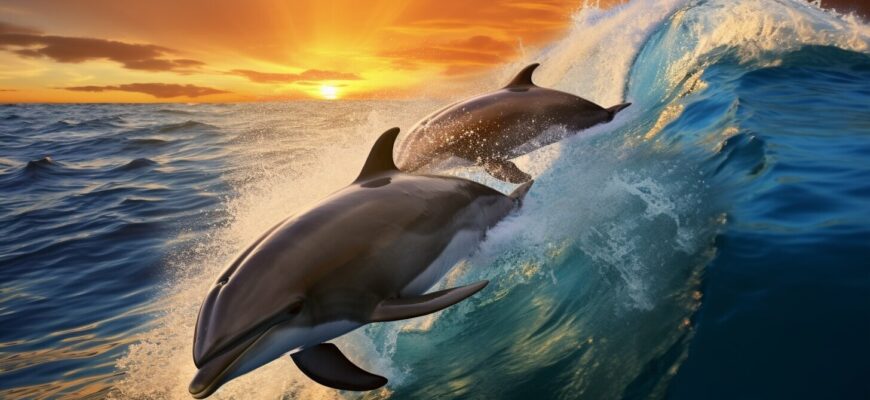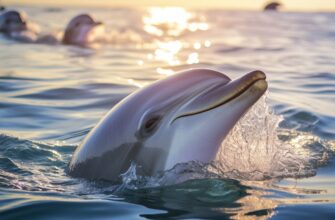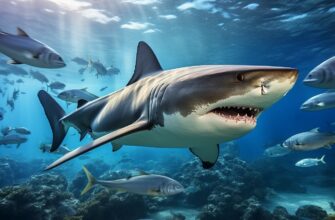Have you ever wondered which creature reigns supreme in the ocean when it comes to speed? Dolphins and sharks are two of the most majestic and powerful marine animals, capable of swimming vast distances and exhibiting impressive agility. But when it comes to a race, are dolphins faster than sharks?
This article will delve into the secrets of sea-speed and provide insights into the capabilities of both dolphins and sharks. From their unique physical adaptations to the various methods used to measure their speed, we’ll explore everything you need to know about these magnificent creatures. So, sit back, grab your snorkeling gear, and prepare to unravel the mystery of dolphin and shark speed in the ocean.
- Understanding Dolphin Speed
- Physical Adaptations for Speed
- Examining Shark Speed
- How Speed is Measured in Aquatic Creatures
- Dolphin Speed Records
- Shark Speed Records
- Dolphins vs Sharks: Racing in the Wild
- Factors Affecting Dolphin and Shark Speed
- The Truth Behind Dolphin and Shark Speed
- Factors Affecting Dolphin and Shark Speed
- Unraveling the Sea-Speed Myths: FAQ
- Are dolphins faster than sharks?
- Do dolphins swim faster than sharks?
- Are dolphins quicker than sharks?
- Can dolphins outswim sharks?
- Is it true that dolphins use their speed to catch prey?
- Do sharks need speed to catch prey?
- Is it true that the water temperature affects dolphin and shark speed?
- Do younger dolphins and sharks swim faster than older ones?
- Can environmental factors such as water currents affect the speed of dolphins and sharks?
- So, who is faster, dolphins or sharks?
- Conclusion: The Need for Speed in the Sea
- The Importance of Speed for Marine Creatures
Understanding Dolphin Speed
When it comes to speed in the ocean, dolphins are known for their impressive abilities. These mammals have evolved to be sleek and streamlined, allowing them to cut effortlessly through the water. But just how fast can dolphins swim, and what makes them so efficient in the water?
According to studies, dolphins can reach top speeds of up to 60 kilometers per hour (37 mph). This makes them faster than most species of sharks, although some sharks, such as the shortfin mako, can swim faster than dolphins.
One of the key reasons dolphins are able to swim so quickly is their muscular tails, known as flukes. These flukes, combined with their smooth bodies and flexible spines, allow dolphins to move in a wave-like motion through the water, propelling themselves forward with incredible speed.
Physical Adaptations for Speed
In addition to their flukes and streamlined bodies, dolphins have several other physical adaptations that enable them to swim so swiftly. They have large, powerful pectoral muscles that help them maneuver through the water, along with a dorsal fin that acts as a stabilizer.
Dolphins also have a unique respiratory system that allows them to hold their breath for long periods of time. This means they can remain underwater and swim at high speeds without the need to resurface for air.
Examining Shark Speed
Sharks are renowned for their formidable speed and precision in the water. They have been known to swim at breakneck speeds, often catching their prey with lightning-fast reflexes.
One of the main secrets to sharks’ speed is their bodies. Sharks have a unique design that allows them to glide through the water with minimal drag. Their streamlined shape and specialized fins enable them to move swiftly and efficiently through the water.
While all sharks are fast swimmers, some species are particularly speedy. For example, the shortfin mako shark has been recorded swimming at speeds of up to 60 miles per hour (96 kilometers per hour) – an impressive feat that makes it one of the fastest fish in the ocean.
Researchers have also studied the swimming abilities of other shark species. One study found that the great white shark can swim at speeds up to 25 miles per hour (40 kilometers per hour), while another found that the bull shark can clock in at speeds of up to 12 miles per hour (19 kilometers per hour).
Despite their impressive speed, sharks are not invincible in the water. They do have predators, including killer whales, and there have been documented cases of sharks being outmaneuvered by their prey, including dolphins.
Overall, sharks are some of the fastest swimmers in the ocean, thanks in large part to their unique physical adaptations. They continue to hold a position of awe and admiration in the marine world.
How Speed is Measured in Aquatic Creatures
In order to compare the speed of dolphins and sharks, scientists use a variety of methods to measure their movements in the water. One popular method involves attaching tags to the animals that transmit data on their speed and location. Another technique involves using underwater cameras and tracking software to monitor their movements.
When analyzing the speed of dolphins and sharks, researchers take into account their swimming patterns and techniques. For example, dolphins are known to travel in groups, which can increase their speed through the water. Sharks, on the other hand, often rely on sudden bursts of speed to capture prey.
By studying the swimming mechanics of dolphins and sharks, scientists can gain a better understanding of how these creatures move through the water. This research can also help inform conservation efforts and promote the protection of these magnificent ocean creatures.
Dolphin Speed Records
Did you know that dolphins are some of the fastest swimmers in the ocean? Here are some of the impressive speed records achieved by different dolphin species:
| Dolphin Species | Top Speed |
|---|---|
| Common Dolphin | 60 km/h (37 mph) |
| Dusky Dolphin | 55 km/h (34 mph) |
| Pacific White-Sided Dolphin | 56 km/h (35 mph) |
These speeds are attainable thanks to the streamlined bodies and muscular tails that dolphins possess. They are able to swim at high speeds for extended periods of time, making them impressive hunters and agile evaders of potential predators.
Interestingly, some types of dolphins have been observed swimming in bursts of speed, reaching up to 90 km/h (56 mph) for short periods of time. However, it’s important to note that this is not their sustained speed and is only achievable for brief moments.
“Dolphins have evolved to become some of the most efficient swimmers in the ocean, and their speed is nothing short of impressive.”
Shark Speed Records
Sharks may have a reputation for being slow and menacing, but there are some species that can swim at impressive speeds. Here are some of the fastest shark species on record:
| Shark Species | Top Speed | Location |
|---|---|---|
| Shortfin Mako Shark | 60 mph (96.6 kph) | Open Ocean |
| Great White Shark | 25 mph (40.2 kph) | Open Ocean |
| Blacktip Shark | 20 mph (32.2 kph) | Coastal Waters |
| Tiger Shark | 18 mph (29 kph) | Open Ocean |
These speeds are impressive, but how do they compare to dolphins? Keep reading to find out!
Dolphins vs Sharks: Racing in the Wild
One of the most common questions asked about dolphins and sharks is who would win in a race. Dolphins are known for their speed and agility, while sharks are renowned for their power and precision. This section will explore real-life encounters between dolphins and sharks in the open ocean, shedding light on whether dolphins are actually faster than sharks.
According to scientific observations, dolphins typically swim faster than sharks in short bursts, but sharks can sustain their speed over longer distances. This means that if a dolphin and a shark were to race over a short distance, the dolphin would likely come out on top. However, if the race were to continue for a longer period, the shark would eventually overtake the dolphin.
It’s also important to note that dolphins are incredibly intelligent and social creatures. They often travel in groups or pods, and may use their teamwork and communication skills to outmaneuver a solitary shark. In fact, there are documented cases of dolphins working together to protect their young or defend their territory from approaching sharks.
Overall, while dolphins may have the edge in short sprints, sharks are better suited for long-distance swimming and may have the advantage in a prolonged race. However, in the wild, there are numerous variables at play, and the outcome of any potential race would depend on a variety of factors, such as species, size, and environmental conditions.
Factors Affecting Dolphin and Shark Speed
There are several factors that can impact the speed of both dolphins and sharks. These factors include:
| Factor | Description |
|---|---|
| Species | The species of the dolphin or shark can greatly affect its speed capabilities. Some species are naturally faster swimmers than others. |
| Age | Youthful dolphins and sharks tend to be faster swimmers than their older counterparts. |
| Water Temperature | The temperature of the water can impact the speed of both creatures. Warmer water tends to be more conducive to faster swimming speeds. |
| Environmental Conditions | The conditions of the surrounding environment can also affect dolphin and shark speed. For example, rough waters with strong currents can impede swimming speed. |
It is important to note that these factors interact with each other in complex and dynamic ways, and the ultimate speed of a dolphin or shark is a result of the interplay between all of these elements.
The Truth Behind Dolphin and Shark Speed
After exploring the speed capabilities of dolphins and sharks, it is clear that both species are impressive swimmers. However, when it comes to determining which creature is faster, it is not a straightforward answer.
Scientific research has shown that dolphins are capable of swimming at speeds of up to 37 miles per hour, while sharks can achieve speeds of up to 20 miles per hour. However, these speeds vary depending on the species, age, and environmental conditions of each animal.
Despite the common misconception that dolphins are always faster than sharks, the truth is that it depends on the specific situation. While dolphins are known to be incredibly agile and able to outswim sharks in some cases, there are also instances where sharks have been observed overtaking dolphins in the water.
Factors Affecting Dolphin and Shark Speed
Several factors can influence the speed of both dolphins and sharks. Water temperature, ocean currents, and the availability of prey can all impact an animal’s swimming abilities. Additionally, the size and age of the animal can play a role, with younger and smaller animals typically being faster and more agile than their older, larger counterparts.
Overall, it is important to recognize that the speed of dolphins and sharks is not a black-and-white issue. Both creatures are uniquely adapted to life in the ocean, and their swimming abilities are influenced by a range of complex factors.
Unraveling the Sea-Speed Myths: FAQ
Are you curious about the truth behind dolphin and shark speed? Here are some common questions and myths, debunked:
Are dolphins faster than sharks?
It depends on the species of dolphin and shark. Some dolphin species, such as the common dolphin, have been recorded swimming at speeds of up to 60 km/h, while some shark species, such as the great white shark, can reach speeds of up to 56 km/h.
Do dolphins swim faster than sharks?
Not necessarily. As stated before, different species of dolphins and sharks have different speed capabilities. It’s important to consider each species individually rather than making broad assumptions.
Are dolphins quicker than sharks?
Again, it depends on the species. Some dolphins are quicker than some sharks, while other sharks are quicker than some dolphins. There is no definitive answer to this question as it varies from species to species.
Can dolphins outswim sharks?
While dolphins are known for their agility and speed, it’s not a guarantee that they can outrun sharks in all situations. It all depends on the specific species and environmental conditions they are in.
Is it true that dolphins use their speed to catch prey?
Yes, dolphins are known to use their speed as a hunting advantage. They are able to chase down their prey, such as small fish and squid, by swimming at high speeds.
Do sharks need speed to catch prey?
Yes, sharks also rely on their speed to catch prey. Some shark species, such as the shortfin mako shark, are known for their impressive speed and are able to chase down their prey.
Is it true that the water temperature affects dolphin and shark speed?
Yes, the water temperature can affect the speed of both dolphins and sharks. In colder water, their movements may become slower due to the denser liquid they’re in. Warmer water, on the other hand, may provide a more favorable environment for faster movements.
Do younger dolphins and sharks swim faster than older ones?
Generally speaking, younger dolphins and sharks have higher energy levels and may be able to swim faster than older ones. However, this can vary depending on the individual animal and other factors such as health and fitness.
Can environmental factors such as water currents affect the speed of dolphins and sharks?
Yes, environmental factors can play a role in the speed of marine animals. Strong water currents, for example, may make it more difficult for dolphins and sharks to swim quickly. On the other hand, favorable currents may provide an advantage for faster swimming.
So, who is faster, dolphins or sharks?
As we’ve discussed, there is no straightforward answer to this question. Certain species of dolphins are faster than certain species of sharks, and vice versa. It’s important to consider each species individually rather than making generalizations.
Conclusion: The Need for Speed in the Sea
After exploring the fascinating world of dolphins and sharks, it is clear that speed plays a crucial role in their survival in the vast ocean. Both creatures have unique physical adaptations and powerful swimming abilities that enable them to navigate through the water with remarkable speed and agility.
Despite popular belief, there is no definitive answer to whether dolphins are faster than sharks or vice versa, as there are various factors that can influence their speed. However, it is certain that both species are incredibly quick and agile in the water.
The Importance of Speed for Marine Creatures
Speed is a vital component of survival in the ocean. Both dolphins and sharks must be able to swim quickly to catch prey, avoid predators, and maintain their position in the ocean’s complex ecosystems. Without their remarkable speed, both species would undoubtedly struggle to survive.
As humans, we must continue to study and appreciate the incredible speed and abilities of these marine creatures. By understanding the importance of speed in the ocean, we can better protect and preserve these remarkable animals and their habitats.
Thank you for joining us on this journey into the world of marine speed. We hope this article has shed some light on the remarkable abilities of dolphins and sharks and inspired you to learn more about these incredible creatures.







